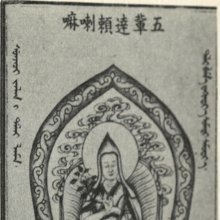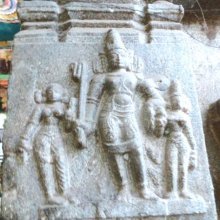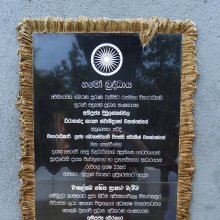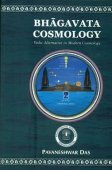Svamin, Svāmin, Svāmi, Svami: 25 definitions
Introduction:
Svamin means something in Buddhism, Pali, Hinduism, Sanskrit, Jainism, Prakrit, the history of ancient India, Marathi, Hindi, biology, Tamil. If you want to know the exact meaning, history, etymology or English translation of this term then check out the descriptions on this page. Add your comment or reference to a book if you want to contribute to this summary article.
Images (photo gallery)
(+4 more images available)
In Hinduism
Dharmashastra (religious law)
Source: Wisdom Library: Dharma-śāstraSvāmin (स्वामिन्) refers to the man riding in the chariot (yāna). It can also be spelled as Svāmi. The word is used throughout Dharmaśāstra literature such as the Manusmṛti. (See the Manubhāṣya, verse 8.293-294)

Dharmashastra (धर्मशास्त्र, dharmaśāstra) contains the instructions (shastra) regarding religious conduct of livelihood (dharma), ceremonies, jurisprudence (study of law) and more. It is categorized as smriti, an important and authoritative selection of books dealing with the Hindu lifestyle.
Natyashastra (theatrics and dramaturgy)
Source: Wisdom Library: Nāṭya-śāstraSvāmin (स्वामिन्, “sire”) refers to a specific “mode of address” (nāman) used in drama (nāṭya), according to Nāṭyaśāstra chapter 19. Svāmin is used to address crown-princes.
Source: Wisdom Library: Nāṭya-śāstraSvāmi (स्वामि, “master”) refers to a term to be used by women in love addressing their beloved during amorous union, according to the Nāṭyaśāstra chapter 24. Accordingly, “he who is a well-wisher of his beloved woman, is able to protect her, is not conceited or jealous, is always alert on every occasion, is called ‘master’ (svāmi)”.

Natyashastra (नाट्यशास्त्र, nāṭyaśāstra) refers to both the ancient Indian tradition (shastra) of performing arts, (natya—theatrics, drama, dance, music), as well as the name of a Sanskrit work dealing with these subjects. It also teaches the rules for composing Dramatic plays (nataka), construction and performance of Theater, and Poetic works (kavya).
Arthashastra (politics and welfare)
Source: Brill: Śaivism and the Tantric Traditions (artha)Svāmin (स्वामिन्) refers to “one’s master”, according to the Arthaśāstra verse 1.9.9-10.—Accordingly, “He should appoint as chaplain a man who comes from a very distinguished family and has an equally distinguished character, who is thoroughly trained in the Veda together with the limbs, in divine omens, and in government, and who could counteract divine and human adversities through Atharvan means. He should follow him as a pupil his teacher, a son his father, and a servant his master (svāmin)”.

Arthashastra (अर्थशास्त्र, arthaśāstra) literature concerns itself with the teachings (shastra) of economic prosperity (artha) statecraft, politics and military tactics. The term arthashastra refers to both the name of these scientific teachings, as well as the name of a Sanskrit work included in such literature. This book was written (3rd century BCE) by by Kautilya, who flourished in the 4th century BCE.
In Buddhism
Tibetan Buddhism (Vajrayana or tantric Buddhism)
Source: Brill: Śaivism and the Tantric Traditions (tantric Buddhism)Svāmin (स्वामिन्) refers to a “lord”, according to the Bhūśalyasūtrapātananimittavidhi section of Jagaddarpaṇa’s Ācāryakriyāsamuccaya, a text within Tantric Buddhism dealing with construction manual for monasteries etc.—Accordingly, “[...] [The officiant] should examine omens. If a cord is cut, the death of a master [will take place]. If the cries of a jackal, a vulture and a heron [are heard], then the death of a lord (svāmin) [will] definitely [take place]. [...]”.

Tibetan Buddhism includes schools such as Nyingma, Kadampa, Kagyu and Gelug. Their primary canon of literature is divided in two broad categories: The Kangyur, which consists of Buddha’s words, and the Tengyur, which includes commentaries from various sources. Esotericism and tantra techniques (vajrayāna) are collected indepently.
In Jainism
General definition (in Jainism)
Source: Encyclopedia of Jainism: Tattvartha SutraSvāmi (स्वामि, “owner”).—The soul which owns telepathy (manaḥparyaya) is its ‘owner’ (svāmi). according to the 2nd-century Tattvārthasūtra 1.25, “Telepathy (manaḥparyaya) and clairvoyance (avadhi) differ with regard to purity (viśuddhi), spatial-range, and species of the knower (svāmi) and the nature of the objects identified by them”.
Source: The University of Sydney: A study of the Twelve ReflectionsSvāmin (स्वामिन्) refers to a “master”, according to the 11th century Jñānārṇava, a treatise on Jain Yoga in roughly 2200 Sanskrit verses composed by Śubhacandra.—Accordingly, “That very same doctrine, which is devoted to the helpless, is a preceptor and a friend, and the doctrine is a master (svāmin) and a brother. It is a protector without a motive. This doctrine saves the three worlds [from] sinking into the pit of hell. Also, it confers happiness beyond the senses for corporeal [souls]”.

Jainism is an Indian religion of Dharma whose doctrine revolves around harmlessness (ahimsa) towards every living being. The two major branches (Digambara and Svetambara) of Jainism stimulate self-control (or, shramana, ‘self-reliance’) and spiritual development through a path of peace for the soul to progess to the ultimate goal.
India history and geography
Source: Cologne Digital Sanskrit Dictionaries: Indian Epigraphical GlossarySvāmin.—(IE 8-3; EI 24; CII 3; LL), royal title probably of foreign origin, assumed by the kings of Śaka-Kuṣāṇa ex- traction; adopted by indigenous rulers like the Śātavāhanas. Cf. Śāmi (SITI), the king. Cf. Vihāra-svāmin (founder or master of a monastery), etc. (EI 7), same as Svāmi-Mahāsena, i. e. Kārttikeya. (EI 23), designation of the member of a guild. (EI 5), cf. ‘the 500 Svāmins of Aiholĕ’; probably meaning the Māheśvaras. Cf. svāmi-vāram (SITI), land-lord's share; same as Tamil mel-vāram. Note: svāmin is defined in the “Indian epigraphical glossary” as it can be found on ancient inscriptions commonly written in Sanskrit, Prakrit or Dravidian languages.

The history of India traces the identification of countries, villages, towns and other regions of India, as well as mythology, zoology, royal dynasties, rulers, tribes, local festivities and traditions and regional languages. Ancient India enjoyed religious freedom and encourages the path of Dharma, a concept common to Buddhism, Hinduism, and Jainism.
Biology (plants and animals)
Source: Google Books: CRC World Dictionary (Regional names)Svami in India is the name of a plant defined with Soymida febrifuga in various botanical sources. This page contains potential references in Ayurveda, modern medicine, and other folk traditions or local practices It has the synonym Soymida febrifuga Juss..
Example references for further research on medicinal uses or toxicity (see latin names for full list):
· Mém. Mus. Paris. (1830)
· Taxon (1981)
If you are looking for specific details regarding Svami, for example diet and recipes, extract dosage, side effects, chemical composition, health benefits, pregnancy safety, have a look at these references.

This sections includes definitions from the five kingdoms of living things: Animals, Plants, Fungi, Protists and Monera. It will include both the official binomial nomenclature (scientific names usually in Latin) as well as regional spellings and variants.
Languages of India and abroad
Marathi-English dictionary
Source: DDSA: The Molesworth Marathi and English DictionarySvāmī (स्वामी).—m (S) A master or lord, the master or lord of: also the proprietor or owner of. Applied to the Deity, a god, a king or prince, a spiritual preceptor, a husband, a holy personage, a learned Brahman, a Gosaawi, Sanyasi &c.
Source: DDSA: The Aryabhusan school dictionary, Marathi-EnglishSvāmī (स्वामी).—m A master, lord; the owner of.
Marathi is an Indo-European language having over 70 million native speakers people in (predominantly) Maharashtra India. Marathi, like many other Indo-Aryan languages, evolved from early forms of Prakrit, which itself is a subset of Sanskrit, one of the most ancient languages of the world.
Sanskrit dictionary
Source: DDSA: The practical Sanskrit-English dictionarySvāmin (स्वामिन्).—a. (-nī f.) [स्व अस्त्यर्थे मिनि दीर्घः (sva astyarthe mini dīrghaḥ)] Possessing proprietory rights. -m.
1) A proprietor, an owner.
2) A lord, master; रघुस्वामिनः सच्चरित्रम् (raghusvāminaḥ saccaritram) Vikr.18.17.
4) A sovereign, king, monarch.
5) A husband.
6) A spiritual preceptor.
7) A learned Brāhmana, an ascetic or religious man of the highest order; (in this sense usually added to proper names).
8) An epithet of Kārtikeya.
9) Of Viṣṇu.
1) Of Śiva.
11) Of the sage Vātsyāyana.
12) Of Garuḍa.
13) The sacrificer, the owner (at a yāga); योऽर्थी स्वत्यागेन ऋत्विजः परिक्रीणीते, यश्च स्वं प्रदेयं त्यजति स स्वामी (yo'rthī svatyāgena ṛtvijaḥ parikrīṇīte, yaśca svaṃ pradeyaṃ tyajati sa svāmī) ŚB. on MS.6.3. 21; तस्मान्न स्वामिनः प्रतिनिधिः (tasmānna svāminaḥ pratinidhiḥ) ibid.
14) The image or temple of a god.
Source: Cologne Digital Sanskrit Dictionaries: Shabda-Sagara Sanskrit-English DictionarySvāmin (स्वामिन्).—mfn. (-mī-minī-mi) Owner, proprietor, master or mistress, &c. m. (-mī) 1. A master, a lord. 2. A sovereign, a prince, a monarch. 3. A husband, a lover. 4. A spiritual preceptor. 5. A learned Brahman or Pandit. 6. An ascetic or religious man of the highest order, (in this sense generally an addition to proper names.) 7. Kartikeya. 8. Vishnu. 9. Siva. 10. The Muni Vatsyayana. 11. A name of Garuda. E. sva own, āminac aff.
Source: Cologne Digital Sanskrit Dictionaries: Benfey Sanskrit-English DictionarySvāmin (स्वामिन्).—i. e. sva + min, m. 1. A proprietor. 2. A master, [Pañcatantra] i. [distich] 328. 3. A sovereign, [Hitopadeśa] 3, 4, M. M. 4. A husband, [Hitopadeśa] 87, 9, M. M.; a lover. 5. A spiritual preceptor. 6. A learned Brāhmaṇa. 7. Viṣṇu, Śiva, Kārttikeya, the god of war, Garuḍa, a fabulous bird. 8. In comp. it signifies often a sanctuary built by, or in honour of those who are denoted in the former part of the comp.; e. g. avanti-, m. a sanctuary built by Avantivarman, [Rājataraṅgiṇī] 5, 45. abhimanyu-, m. A sanctuary built in commemoration of Abhimanyu, [Rājataraṅgiṇī] 6, 299. dharma-, m. A sanctuary built by Dharma, [Rājataraṅgiṇī] 4, 696. viṣṇu-, A sanctuary built in honour of Viṣṇu, [Rājataraṅgiṇī] 5, 99.
Source: Cologne Digital Sanskrit Dictionaries: Cappeller Sanskrit-English DictionarySvāmin (स्वामिन्).—[masculine] owner, proprietor, master, lord; [feminine] nī.
Source: Cologne Digital Sanskrit Dictionaries: Aufrecht Catalogus Catalogorum1) Svāmin (स्वामिन्) as mentioned in Aufrecht’s Catalogus Catalogorum:—pupil of Ananyānubhavasvāmin: Dakṣiṇāmūrtistotrārthapratipādakanibandha or Mānasollāsa (?). P. 22. Pañcapādikāvivaraṇa. Laukikanyāyamuktāvalī. Śārīrakamīmāṃsānyāyasaṃgraha, a
—[commentary] on the Brahmasūtra.
Svāmin has the following synonyms: Prakāśātman yati.
2) Svāmin (स्वामिन्):—abbreviated from Kṣīrasvāmin and Śabarasvāmin, and of a few other names ending in svāmin.
3) Svāmin (स्वामिन्):—Devībhāgavatapurāṇaṭīkā.
Source: Cologne Digital Sanskrit Dictionaries: Monier-Williams Sanskrit-English Dictionary1) Svāmin (स्वामिन्):—[from sva] a See p. 1284, col. 1.
2) b m. ([from] 1. sva + min) an owner, proprietor, master, lord or owner of ([genitive case] [locative case], or [compound]), [Manu-smṛti; Mahābhārata] etc.
3) a chief, commander (of an army), [Vikramorvaśī; Subhāṣitāvali]
4) a husband, lover ([dual number] ‘husband and wife’), [Āpastamba; Manu-smṛti; Mahābhārata] etc.
5) a king, prince (in [dramatic language] used as a form of address = deva)
6) a spiritual preceptor, learned Brāhman or Pandit (used as a title at the end of names, [especially] of natives of the Carnatic)
7) the image or temple of a god (often ifc.; See śrīdhara-, viṣṇu-sv etc.)
8) Name of Skanda, [Yājñavalkya i, 293]
9) of Viṣṇu, [cf. Lexicographers, esp. such as amarasiṃha, halāyudha, hemacandra, etc.]
10) of Śiva, [cf. Lexicographers, esp. such as amarasiṃha, halāyudha, hemacandra, etc.]
11) of Garuḍa, [cf. Lexicographers, esp. such as amarasiṃha, halāyudha, hemacandra, etc.]
12) of the Muni Vātsyāyana, [cf. Lexicographers, esp. such as amarasiṃha, halāyudha, hemacandra, etc.]
13) of the 11th Arhat of the past Utsarpiṇī, [cf. Lexicographers, esp. such as amarasiṃha, halāyudha, hemacandra, etc.]
14) of various authors (also with miśra and śāstrin; sometimes abridged from names ending in svāmin e.g. for kṣīraand śabara-svāmin), [Catalogue(s)]
Source: Cologne Digital Sanskrit Dictionaries: Monier-Williams Sanskrit-English DictionarySvāmi (स्वामि):—[from svāmin] in [compound] for svāmin.
Source: Cologne Digital Sanskrit Dictionaries: Yates Sanskrit-English DictionarySvāmin (स्वामिन्):—(mī) 5. m. A master, a husband; a proprietor, king; a god; Kārtikeya; Shiva.
Source: DDSA: Paia-sadda-mahannavo; a comprehensive Prakrit Hindi dictionary (S)Svāmin (स्वामिन्) in the Sanskrit language is related to the Prakrit words: Sāmi, Sāmia.
[Sanskrit to German]
Sanskrit, also spelled संस्कृतम् (saṃskṛtam), is an ancient language of India commonly seen as the grandmother of the Indo-European language family (even English!). Closely allied with Prakrit and Pali, Sanskrit is more exhaustive in both grammar and terms and has the most extensive collection of literature in the world, greatly surpassing its sister-languages Greek and Latin.
Hindi dictionary
Source: DDSA: A practical Hindi-English dictionarySvāmī (स्वामी) [Also spelled swami]:—(nm) master, lord; proprietor, owner; husband; a title used with the name of saints and ascetics (as [svāmī dayānaṃda]); ~[mibhakta] loyal, faithful; ~[mi-bhakti] loyalty, faithfulness.
...
Kannada-English dictionary
Source: Alar: Kannada-English corpusSvāmi (ಸ್ವಾಮಿ):—
1) [noun] a lord; a master; an employer.
2) [noun] a god.
3) [noun] a ruler; a king.
4) [noun] a man as he is related to his wife; husband.
5) [noun] a spiritual teacher.
6) [noun] a learned brāhmaṇa.
7) [noun] a monk or sage.
8) [noun] Ṣaṇmukha, the son of Śiva.
9) [noun] Śiva.
10) [noun] Viṣṇu.
11) [noun] Garuḍa, the king of birds and the ehicle of Viṣṇu.
12) [noun] the sage Vātsyāyana.
13) [noun] the medium-sized tree Soymida febrifuga of Meliaceae family; bastard cedar; Indian redwood.
14) [noun] a respectful mode of addressing men or used in the solutation in a letter.
15) [noun] (hist.) a member of a merchants' association or union.
16) [noun] ಸ್ವಾಮಿ ಪಾದ ಸೇರು [svami pada seru] svāmi pāda sēru to die; to pass away.
Kannada is a Dravidian language (as opposed to the Indo-European language family) mainly spoken in the southwestern region of India.
Tamil dictionary
Source: DDSA: University of Madras: Tamil LexiconSvāmi (ஸ்வாமி) noun < svāmin. See சுவாமி. [suvami.]
Tamil is an ancient language of India from the Dravidian family spoken by roughly 250 million people mainly in southern India and Sri Lanka.
Nepali dictionary
Source: unoes: Nepali-English DictionarySvāmī (स्वामी):—n. master; owner; lord; proprietor; husband;
Nepali is the primary language of the Nepalese people counting almost 20 million native speakers. The country of Nepal is situated in the Himalaya mountain range to the north of India.
See also (Relevant definitions)
Starts with (+4): Svamibhattaraka, Svamibhava, Svamiguna, Svamijanaka, Svamijanghin, Svamikarttikeya, Svamikarya, Svamimula, Svamin mishra, Svamin shastrin, Svaminatan, Svamini, Svaminiprarthana, Svaministotra, Svaminy, Svaminyashtaka, Svamipala, Svamisadbhava, Svamisaubhagya, Svamiseva.
Ends with (+243): Abhimanyusvamin, Abhinandanasvamin, Abhirama gosvamin, Acalasvamin, Adityasvamin, Agnisvamin, Agragosvamin, Anantasvāmin, Ananyadasasvamin, Ananyanubhavasvamin, Aryasvamin, Asvamin, Avantisvamin, Balabhadrasvamin, Bhadrabahusvamin, Bhagavat gosvamin, Bhagavatananda gosvamin, Bharatasvamin, Bhartrisvamin, Bhatta ishvarasvamin.
Full-text (+546): Svamika, Svamisadbhava, Gosvamin, Svamiseva, Svamimula, Svamibhattaraka, Svamikarya, Bhusvamin, Svamipala, Yanasvamin, Svamikarttikanupreksha, Svamipalavivadataramga, Asvamivikraya, Asvamin, Svamibhava, Svamigirimahatmya, Svamikarttika, Svamishailamahatmya, Svamiprasadat, Shridhara Svami.
Relevant text
Search found 88 books and stories containing Svamin, Svaami, Svāmi, Svāmī, Svami, Svāmin; (plurals include: Svamins, Svaamis, Svāmis, Svāmīs, Svamis, Svāmins). You can also click to the full overview containing English textual excerpts. Below are direct links for the most relevant articles:
The Matsya Purana (critical study) (by Kushal Kalita)
Part 2 - The components of the State (the saptāṅga theory) < [Chapter 6 - Polity in the Matsyapurāṇa]
Garga Samhita (English) (by Danavir Goswami)
Verses 5.24.64-65 < [Chapter 24 - The Killing of the Kola Demon]
Tattvartha Sutra (with commentary) (by Vijay K. Jain)
Verse 1.25 - Difference between telepathy and clairvoyance < [Chapter 1 - Right Faith and Knowledge]
The Skanda Purana (by G. V. Tagare)
Chapter 325 - Greatness of Unnata Svāmī (Svāmin) < [Section 1 - Prabhāsa-kṣetra-māhātmya]
Chapter 215 - Greatness of Kumāreśvara (Kumāra-īśvara) < [Section 1 - Prabhāsa-kṣetra-māhātmya]
Chapter 330 - Greatness of Talasvāmī (Talasvāmin) < [Section 1 - Prabhāsa-kṣetra-māhātmya]
Impact of Vedic Culture on Society (by Kaushik Acharya)
3. The Donee Brāhmaṇas < [Chapter 2]
Sanskrit Inscriptions (D): The Kaṭāccuris / Early Kalācuris < [Chapter 3]
Sanskrit Inscriptions (E): The Pāṇḍuvaṃśīs < [Chapter 3]
Prasthanatrayi Swaminarayan Bhashyam (Study) (by Sadhu Gyanananddas)
4.3.1. The cause of Pramāṇa and Pramā < [Chapter 2 - Analysis on the Basis Of Epistemology]
7.2. What to Understand in Upāsanā < [Chapter 4 - Analysis on the Basis of Spiritual Endeavour]
Related products
(+1 more products available)










